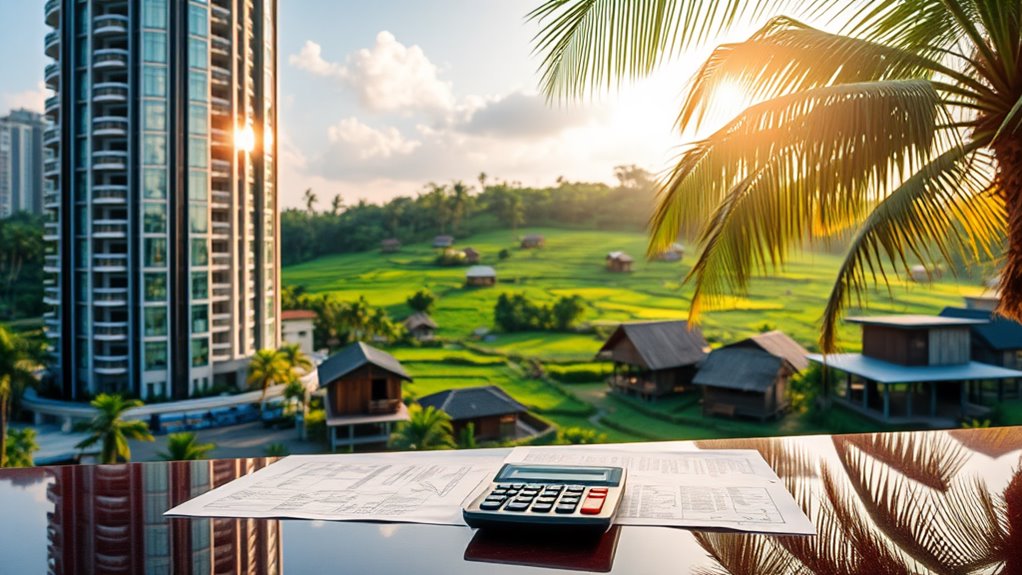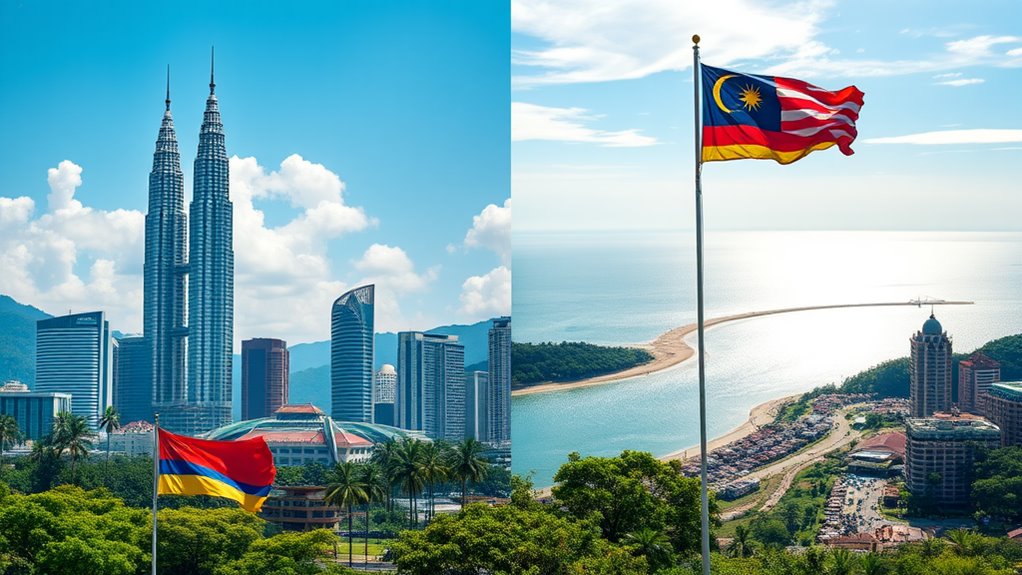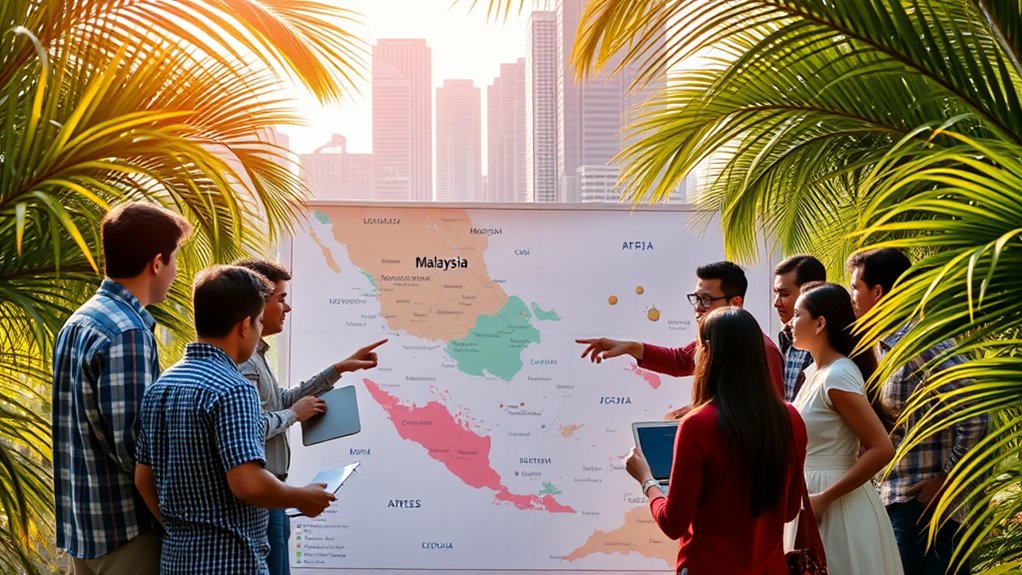Maneuvering the intricate web of property laws in Malaysia might feel like a walk in the park for some, while for others, it resembles a intimidating maze. You'll find that each state has its own unique regulations that can notably influence your property transactions. Whether you're considering foreign ownership or trying to grasp the local buying processes, understanding these nuances is essential to avoid pitfalls. So, what specific regulations should you be aware of to make informed decisions in this diverse landscape?
Overview of Property Laws
When maneuvering Malaysia's property laws, it's vital to understand the foundational role of the National Land Code 1965. This code sets the stage for how land ownership works in Peninsular Malaysia, outlining everything from registration to property transactions.
You might feel overwhelmed by the details, especially since each state has its own unique rules and requirements. For instance, some states might require higher minimum purchase prices, making it tough for many.
Think about the ownership structures, too—freehold versus leasehold titles. Leasehold properties can only be yours for a limited time, often up to 99 years. Imagine investing in something you can't call your own forever!
And don't forget about the registration system; it follows the Torrens system, which, while designed to protect your ownership, can feel complicated. You'll need to register with the Land Registry, and without that, your claim to the property is shaky at best.
Navigating these laws can be a frustrating experience, especially with all the state-specific approvals and fees for foreigners. It's important to take your time and fully understand these regulations to protect your investment and guarantee a safe purchase. Additionally, obtaining state consent is a crucial step in the process, varying in approval processes and fees across different regions.
Foreign Ownership Regulations
Purchasing property in Malaysia as a foreigner can be exciting yet complex, given the diverse regulations in play. You might think it's straightforward, but there are quite a few hurdles.
For instance, in Kuala Lumpur, Putrajaya, and Labuan, you'll need to shell out at least RM1 million. That's a hefty sum, especially when you consider that certain properties, like Malay reserved land and low-cost housing, are off-limits for foreigners.
Navigating state-specific rules can also feel like a maze. In Penang, for example, there's an extra 3% levy on foreign purchases, while Johor adds a 2% charge. These costs pile up quickly and can take you by surprise if you're not prepared.
You must get approval from local authorities, and keeping track of different ownership rights based on local laws can be frustrating. Foreign buyers in Johor must also ensure compliance with the National Land Code 1965, which lays down the legal groundwork for property acquisition.
The National Land Code of 1965 lays down the legal groundwork, but it can be overwhelming. It's essential to stay informed and compliant to avoid potential pitfalls.
Types of Properties Available

Understanding the types of properties available in Malaysia is key to making informed decisions as a foreign buyer. You might be surprised to learn that foreign ownership varies greatly from state to state.
In bustling Kuala Lumpur, for example, you'll need to invest at least RM1 million to buy a property, while in Johor, the price can range from RM1 million to RM2 million. It can be quite frustrating when you realize that certain properties, like low-cost or medium-cost units, are completely off-limits to you. Properties reserved for Bumiputera groups and Malay reserved land are also not options.
In Selangor, things get even trickier. Foreigners can only own landed properties, and auction properties are a no-go.
Yet, there's a silver lining: the Malaysia My Second Home (MM2H) program offers lower minimum price thresholds for residential properties, opening doors for long-term residency. Additionally, government policies are promoting foreign investment in real estate, creating more opportunities for buyers.
Navigating these regulations can feel overwhelming, especially when you just want a safe place to call home. Understanding these property types and restrictions is crucial, so you can make smart choices and avoid unnecessary heartache in your property experience.
Buying Process for Foreigners
Maneuvering the buying process as a foreigner in Malaysia can be straightforward if you know what steps to take. Initially, you'll need to search for properties that fit your needs, making certain they meet the specific eligibility requirements for foreign buyers in the state you're interested in.
Once you find a property, you'll submit a Letter of Offer along with a 2-3% upfront payment of the purchase price.
After your offer gets accepted, you'll have 14 days to sign the Sale and Purchase Agreement and provide a down payment of 10%. This part can feel a bit overwhelming, but remember you're not alone. Engaging a local legal counsel is vital. They'll help you navigate the paperwork and guarantee you're adhering to all state regulations, which can save you from potential headaches down the line.
If you're considering financing, keep in mind that programs like MM2H can allow you to finance up to 80% of the property's value, while other foreign buyers may get up to 70%. Additionally, securing a loan will require you to have a solid credit score, as it plays a crucial role in determining your eligibility and loan terms for home financing options.
It's a lot to juggle, but taking it step by step can make the process smoother.
Costs and Financial Considerations

When diving into property ownership in Malaysia, it's crucial to be aware of the different costs and financial considerations that come into play. For foreign buyers like you, the 4% stamp duty on ownership transfer can feel like a hefty obstacle. You might think, "Why isn't this clearer?"
Legal fees can be puzzling too; they start at 1.25% for the initial RM500,000, but if you're looking at properties over RM7,500,000, prepare for negotiations that can feel overwhelming.
Each state has its own registration fees at the Land Registry, which adds another layer of complexity. If you're feeling a bit lost, you're not alone. Many foreign buyers underestimate the significance of thorough financial planning, which includes understanding property loans and potential state-specific levies. It's also essential to consider total home loan costs, as hidden fees can significantly impact your overall budget.
It's wise to engage with local real estate agents who can guide you through these financial pitfalls. They can help you navigate the maze of costs associated with ownership and transactions.
The emotional weight of these decisions can be tough, but knowing what to expect can make this expedition a little less intimidating.
Tax Implications for Property Owners
Maneuvering the tax landscape as a property owner in Malaysia can feel intimidating, especially with diverse obligations to keep track of.
You've got quit rent, which is an annual charge for owning the land, and assessment tax, usually charged twice a year based on your property's value and the local services you receive.
For non-resident owners, there's the Real Property Gains Tax (RPGT) when you sell your property, and it can feel unfair as the rates depend on how long you've held the property.
Don't forget about stamp duty; if you're a non-citizen, that's a flat 4% of your property's price, which can really add up.
Plus, there are registration fees that vary by state when you register your property at the Land Registry, further complicating your expenses.
If you're renting out your property, income tax kicks in on that rental income, with different rates for residents and non-residents.
It can all feel overwhelming and frustrating, making it essential to stay informed and prepared. Understanding the mortgage rates in Malaysia will also help you navigate your financial obligations effectively.
Being aware of these tax implications will help you navigate this maze and protect your investment.
State-Specific Regulations

Steering through property regulations in Malaysia can vary greatly from state to state, making it vital for potential buyers to understand the local laws before making a purchase.
It can feel overwhelming when you realize that each state has its own set of rules. For example, in Penang, foreigners are looking at a minimum purchase price between RM750,000 and RM1.8 million for landed homes.
Meanwhile, in Selangor, you're facing a whopping RM2 million just to step into the market, plus extra restrictions on agricultural land.
Kuala Lumpur isn't much easier, as you'll need at least RM1 million, and just to make it more intimidating, the average cost per square meter is around RM12,804.
Johor offers a slight reprieve with prices ranging from RM1 million to RM2 million based on where you're buying, but MM2H participants still need to invest at least RM1 million.
And then there's Sarawak, where foreigners can buy properties for RM500,000 to RM600,000, but only with state authority approval.
It's important to know these details—being informed can save you from costly mistakes and heartache in the long run. Additionally, understanding the mixed economic indicators can provide further insight into the property market trends across different states.
Cultural Insights for Expats
Although moving to Malaysia can be an exciting adventure, understanding its cultural landscape is vital for expats looking to feel at home. With a rich tapestry of ethnic groups like Malay, Chinese, and Indian, the country offers a diverse social fabric that's both welcoming and complex.
You might find yourself overwhelmed initially, especially regarding local cuisine. Dishes like Nasi Lemak or Roti Canai are delightful but can be intimidating if you're not used to trying new foods.
One of the more surprising aspects is the language. You'll hear "Manglish," a unique blend of English and local dialects, which can be confusing at times. It took me a while to catch on, but it's all part of the experience.
What truly stands out, though, is the warmth of the people. Malaysians are known for their hospitality and humor, which can make your integration easier.
Participating in festivals like Hari Raya or Chinese New Year not only immerses you in the culture but also helps build connections. Don't shy away; engaging with these events will deepen your understanding and sense of belonging. Additionally, recognizing the rise of suburban living can provide insights into the evolving lifestyle choices of many Malaysians, which may enhance your social interactions and community engagement.
Resources for Property Buyers

Maneuvering the property market in Malaysia requires a solid understanding of the regulations and resources available to you as a buyer. It can be overwhelming, especially when you realize each state has its own rules and minimum prices for foreign buyers.
For instance, in Kuala Lumpur, you need at least RM1 million, while in Selangor, it jumps to RM2 million. That's a big difference!
To make your experience smoother, here are three crucial resources you should consider:
- National Land Code 1965: This outlines foreign ownership regulations and state-specific guidelines, so you know what to expect.
- Local Real Estate Agents: They're invaluable for understanding property options and state laws, which can be confusing and vary drastically.
- MM2H Program: This offers financial incentives and lower minimum price thresholds for long-term residents, making it easier to invest in property.
Additionally, understanding infrastructure development can significantly enhance your investment strategy, as it often drives property values and tenant demand.
Don't forget to plan for supplementary costs like a 4% stamp duty for non-citizens and legal fees based on property prices.
All of this can feel intimidating, but being informed is your safest bet in this market.
Frequently Asked Questions
What Is Property Law in Malaysia?
Property law in Malaysia regulates land ownership and transactions. You'll encounter freehold and leasehold distinctions, and foreign buyers face specific restrictions. It's essential to understand documentation requirements for a secure property investment.
What Are the Different Types of Property Ownership in Malaysia?
When exploring Malaysia's property landscape, you'll uncover two main types: freehold, offering lifetime ownership, and leasehold, which grants temporary rights. Each comes with its own set of rules, protecting your investment and future.
Can Foreigners Buy Property in Sarawak?
Yes, you can buy property in Sarawak as a foreigner, but you'll need approval from the Land and Survey Department. Make certain you meet the minimum price and avoid native lands to stay compliant.
Can a Non-Malaysian Citizen Own Property in Malaysia?
Yes, you can own property in Malaysia as a non-citizen, but you'll need to follow state-specific regulations. Be mindful of minimum price thresholds and restrictions on certain property types to guarantee a safe investment.
Conclusion
Steering through property laws in Malaysia can feel like a maze, especially when each state has its own rules. For example, did you know that Penang requires foreign buyers to invest a minimum of RM3 million? It's frustrating to think that even a small misunderstanding can lead to costly mistakes. You've got to do your homework and stay informed to avoid pitfalls. After all, buying property should be an exciting adventure, not a stressful nightmare filled with red tape and confusion.